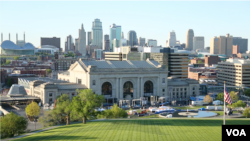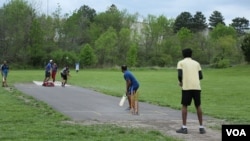Nearly 7,000 immigrants from India live in greater Kansas City, Kansas, in the middle of the U.S. and on the border between two red states.
Temples, Indian grocery stores, and restaurants have been serving the community for decades.
But now proposed changes to H1-B visa policies could leave many of the Indian-Americans in Kansas City and across the U.S. without jobs and, potentially, forced to return home.
President Donald Trump recently signed an executive order aimed at making it harder for companies to hire skilled foreign workers under the H1-B visa program. Overwhelmingly, those workers have come from India. The U.S. government reports that in 2015, 71% of H1-B visa holders were Indian.
“I may lose my opportunities and my career may be done,” said Akhil Kodaru, a project manager at the Sprint telecommunications company in Kansas City.
Sprint, which largely hires H1-B visa holders through contracting companies, has had multiple large-scale layoffs in recent years, and many employees believe that should the company be required to vastly increase the salaries for these visa holders, they would be fired. Increasing salaries is one proposal that has been made to reform the H1-B visa program.
The Trump order called for a multi-agency review of the program which will take time, and visa holders in Kansas City are trying to reserve panic for when the full consequences of the proposed action become clearer.
“If you start worrying today then you cannot do your job,” said Vijaykumar Kalimuthu Ponnusamy. “We are here to do the job, at this point – spend some time with the family, friends, and at work - and we can be proactive in …understand(ing) the law and then be prepared for what it is.”
Like many Indians here, Ponnusamy is choosing to remain calm and continue to plant roots in the city.
Hate crime
The Indian community has also been touched by violence.
Srinivas Kuchibhotla was killed and Alok Madasani, injured, as they enjoyed an after-work drink at Austins Bar and Grill in the suburb of Olathe last February.Charged with the shootings, Adam Purinton (51) had been heard earlier making ethnic slurs about the two men.
Both men worked as engineers at GPS-maker Garmin, and both were members of one of the 24 cricket teams supported by the community.
A team member says the shooting has changed the play. “We don’t get that upset because we have our set of arguments on the ground over the game but that always stays in the back of your heart now,” Hemant Tiwari, captain of one of the teams based in Olathe, told VOA.
Though the initial shock of the hate crime has largely worn off, many Indians see the city they call home differently.
Brijpal Singh, a board member of the Indian Association of Kansas City and 20-year resident of the area, said he cannot help but be more cautious.
“Earlier, if I had to get groceries at 11, 12 at night I would get in my car and just go,” Singh told VOA. “But now…there is some fear. You start thinking, ‘Am I as free to move around as I was, or do I have to think again before I make a decision to go out at odd hours of the night?’”
Cricket league
Made up mostly of South Asians, the cricket league has grown and spread to share a small number of fields with other sports leagues such as rugby.
Since the shooting, the government of Kansas has promised to build a real cricket pitch. The gesture means a lot to the community.
Anil Singh, a cricket player in Olathe, has been in the area for nearly ten years and just last month became a U.S. citizen. Though he worries for his friends on H1-B visas and was shaken by the shooting, he said he is not considering leaving, although he had never planned to stay so long.
“We moved here from New York City and we never thought…I mean who goes to Kansas, right?” He told VOA, running to meet us from bowling a round at cricket practice.“But now, yeah, picket fence, house, dog, kids!”
The cricket league, which started as a few Sprint employees playing in the company campus’s basketball court, is just one of many activities South Asians in the Kansas City area can participate in.
“I think in other bigger cities like New York and all people are really too busy to even socialize with each other,” Singh’s wife Ajit Marhas said.
“But here it’s a very small community so weekends are always busy with them – they are like family.”







